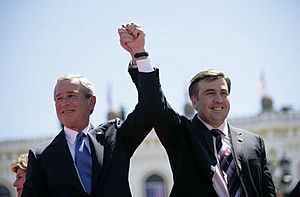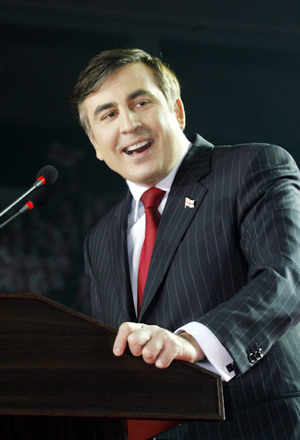Mikheil Saakashvili facts for kids
Quick facts for kids
Mikheil Saakashvili
|
|
|---|---|
|
|
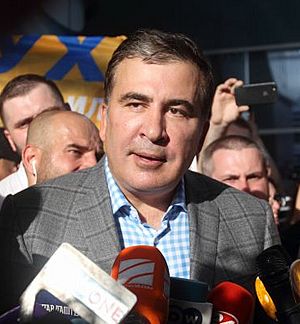
Saakashvili in 2019
|
|
| 3rd President of Georgia | |
| In office 20 January 2008 – 17 November 2013 |
|
| Prime Minister |
|
| Preceded by | Nino Burjanadze (acting) |
| Succeeded by | Giorgi Margvelashvili |
| In office 25 January 2004 – 25 November 2007 |
|
| Prime Minister |
|
| Preceded by | Nino Burjanadze (acting) |
| Succeeded by | Nino Burjanadze (acting) |
| 10th Governor of Odesa Oblast | |
| In office 30 May 2015 – 9 November 2016 |
|
| President | Petro Poroshenko |
| Prime Minister | |
| Preceded by | Ihor Palytsia |
| Succeeded by | Solomiia Bobrovska (acting) |
| Chairman of the Executive Committee of the National Council for Reforms of Ukraine | |
| In office 7 May 2020 – 27 September 2021 |
|
| President | Volodymyr Zelenskyy |
| Prime Minister | Denys Shmyhal |
| Preceded by | Position established |
| Succeeded by | Position abolished |
| Minister of Justice of Georgia | |
| In office 12 October 2000 – 19 September 2001 |
|
| President | Eduard Shevardnadze |
| Prime Minister | Giorgi Arsenishvili |
| Preceded by | John Khetsuriani |
| Succeeded by | Roland Giligashvili |
| Prime Minister of Georgia | |
|
Acting
|
|
| In office 3 February 2005 – 17 February 2005 |
|
| President | Himself |
| Preceded by | Zurab Zhvania |
| Succeeded by | Zurab Noghaideli |
| Member of the Parliament of Georgia | |
| In office 6 November 2001 – 22 November 2002 |
|
| In office 25 November 1995 – 2 March 2001 |
|
| Chairman of the Tbilisi City Assembly | |
| In office 4 November 2001 – 2003 |
|
| Chair of Union of Citizens Faction in the Parliament of Georgia | |
| In office 15 September 1998 – 20 November 1999 |
|
| In office 27 November 1999 – 10 October 2000 |
|
| Chair of Legal Issues Committee in the Parliament of Georgia | |
| In office 27 November 1995 – 15 September 1998 |
|
| Chairman of the United National Movement | |
| In office 2001 – 24 March 2019 |
|
| Preceded by | Position established |
| Succeeded by | Grigol Vashadze |
| Chairman of the Movement of New Forces | |
| Assumed office 23 February 2017 |
|
| Preceded by | Position established |
| Honorary Chairman of the United National Movement | |
| Assumed office 24 March 2019 |
|
| Preceded by | Position established |
| Personal details | |
| Born | 21 December 1967 Tbilisi, Georgian SSR, Soviet Union |
| Citizenship |
|
| Political party |
|
| Spouse |
Sandra Roelofs
(m. 1994) |
| Children | 4 |
| Education |
|
| Occupation | Jurist, politician |
| Signature | |
Mikheil Saakashvili (born 21 December 1967) is a Georgian-Ukrainian politician. He served as the third President of Georgia for two terms, from January 2004 to November 2013. He founded the United National Movement party in Georgia. Later, from May 2015 to November 2016, Saakashvili was the governor of Ukraine's Odesa Oblast. He returned to Georgia in 2021 and has been in prison there since.
Contents
Early Life and Education
Mikheil Saakashvili was born in Tbilisi, the capital of what was then the Georgian Soviet Socialist Republic in the Soviet Union, on 21 December 1967. His father, Nikoloz Saakashvili, is a doctor. His mother, Giuli Alasania, is a historian and university lecturer.
Saakashvili studied at the Taras Shevchenko National University of Kyiv in Ukraine, graduating in 1992 with a degree in international law. While there, he became friends with Petro Poroshenko, who later became President of Ukraine. Saakashvili also took part in student protests in 1990 known as the "Revolution on Granite".
He continued his education in the United States, earning a master's degree from Columbia Law School in 1994. He also studied at George Washington University and the International Institute of Human Rights in France.
Start in Georgian Politics
After finishing his studies, Saakashvili worked at the United Nations. In 1995, he was invited to join politics in Georgia by a friend, Zurab Zhvania. Both men won seats in the Parliament of Georgia as part of President Eduard Shevardnadze's party, the Union of Citizens of Georgia.
Saakashvili became the chairman of a parliamentary committee. This committee worked on creating a new election system, an independent court system, and a police force that was not involved in politics. In October 2000, he became the Minister of Justice. He started big changes in Georgia's justice and prison systems.
In September 2001, Saakashvili resigned from his role as Minister of Justice. He stated that corruption had become too widespread in the government and that President Shevardnadze was not doing enough to stop it.
The Rose Revolution
After leaving the government, Saakashvili started his own political party in October 2001, called the United National Movement (UNM). This party focused on reforms. In 2002, he was elected chairman of the Tbilisi City Assembly, which gave him a strong position to speak out against the government.
In November 2003, Georgia held parliamentary elections. Many observers, both local and international, said the elections were unfair. Saakashvili claimed his party had won and encouraged Georgians to protest peacefully against the government.
Large protests took place in Tbilisi, with thousands of people joining. A youth group called Kmara ("Enough!") and other organizations helped organize these protests. After two weeks of demonstrations, President Shevardnadze resigned on 23 November 2003. This peaceful change of power became known as the Rose Revolution.
First Term as President
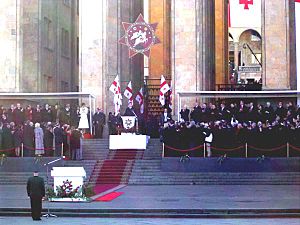
After the Rose Revolution, a new presidential election was held in January 2004. Mikheil Saakashvili won with a very high number of votes, becoming the youngest national president in Europe at 36 years old.
He promised to fight corruption and improve the economy. He also wanted to strengthen Georgia's ties with Western countries like the US and join NATO and the European Union. However, he also spoke about the importance of good relations with Russia.
One of his first challenges was a political crisis in the region of Adjara. The local leader, Aslan Abashidze, largely ignored the central government. Saakashvili's government solved this problem peacefully in May 2004, and Abashidze resigned.
Reforms and Changes
When Saakashvili became president, Georgia faced many problems. The economy was struggling, corruption was widespread, crime rates were high, and public services like electricity and water were unreliable. Saakashvili started a huge reform program.
- Fighting Corruption: He fired many officials and police officers suspected of corruption. He also raised the salaries of state employees so they would not need bribes.
- Economic Changes: His government made it easier to do business by cutting down on complicated rules and encouraging foreign investment. They also simplified the tax system. As a result, the government's income grew a lot.
- Infrastructure: Water and power systems were improved, schools and hospitals were renovated, and new roads and housing were built.
- Military: Saakashvili's government greatly increased spending on the military to make the Georgian Armed Forces stronger and more modern.
- Education: A new system for university entrance exams was introduced, replacing a system where people paid bribes to get in. This made university access based on merit.
- Healthcare: Most public hospitals and clinics were privatized, and private insurance companies began offering coverage. This led to better healthcare facilities.
These changes helped reduce corruption and improve the business environment. Georgia's economy grew significantly, and the standard of living improved for many.
Foreign Relations
Saakashvili believed that joining NATO was important for Georgia's safety. He worked closely with the US and other NATO countries. Georgia also sent troops to support international missions in places like Iraq, Kosovo, and Afghanistan.
He also maintained good relations with neighboring countries and other Western-oriented nations.
2007 Political Challenges
In 2007, Georgia faced a difficult political period. There were large protests against the government, led by opposition groups. The government used police force to break up some of these protests, which led to criticism both inside and outside Georgia.
To ease the tension, President Saakashvili announced early presidential elections for January 2008. He also made some changes to the election rules to address the opposition's concerns.
Second Term as President
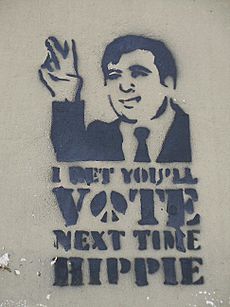
Mikheil Saakashvili was re-elected president in January 2008. After his re-election, he made changes to his government, appointing new ministers.
Russo-Georgian War (2008)
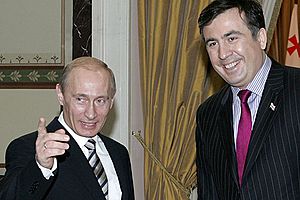
In August 2008, a conflict broke out between Georgia and Russia, known as the Russo-Georgian War. This war involved the regions of South Ossetia and Abkhazia, which had long-standing conflicts with Georgia. Russian military forces intervened.
The war lasted five days. Georgia lost control of the disputed territories, and Russia recognized their independence. In response, Georgia broke off diplomatic relations with Russia.
After the war, Saakashvili's government worked to rebuild Georgia's military. They increased military spending and began to produce their own armored vehicles and weapons.
End of Presidency
In October 2012, Saakashvili's party lost the parliamentary election to the Georgian Dream party. He accepted the defeat. Since the constitution limited him to two terms, he could not run for president again in the 2013 election. He left Georgia shortly after the election.
Life in Ukraine
Saakashvili strongly supported Ukraine's Euromaidan movement and the Revolution of Dignity in 2014.
In May 2015, Ukrainian President Petro Poroshenko appointed Saakashvili as the Governor of Odesa Oblast, a region in Ukraine. To take this job, Saakashvili became a Ukrainian citizen, which meant he lost his Georgian citizenship.
In November 2016, Saakashvili resigned as governor. He stated that corruption in Ukraine was a major reason for his decision. Four days later, he announced he would create a new Ukrainian political party called "Movement of New Forces".
In July 2017, President Poroshenko took away Saakashvili's Ukrainian citizenship, making him stateless. Saakashvili said he would fight to return to Ukraine. He eventually returned in May 2019 after the new Ukrainian President, Volodymyr Zelenskyy, restored his citizenship. In May 2020, President Zelenskyy appointed Saakashvili to lead Ukraine's National Reform Council.
Return to Georgia and Imprisonment
In October 2021, Saakashvili announced he had returned to Georgia after an eight-year absence. However, Georgian authorities stated he had entered the country illegally. Later that day, Georgian Prime Minister Irakli Garibashvili announced that Saakashvili had been arrested in Tbilisi. He was then imprisoned in Rustavi.
Saakashvili had been sentenced to prison in 2018 while he was not in Georgia. The charges included abuse of power. President of Georgia Salome Zourabichvili stated that she would not pardon him.
While in prison, Saakashvili's health became a concern. He was moved to different hospitals for treatment. His lawyers and some international groups have asked for his release on medical grounds. Despite being imprisoned, Saakashvili has remained active in politics, writing articles and communicating with supporters.
Personal Life
Saakashvili is married to Sandra Roelofs, a linguist from the Netherlands. They have two sons, Eduard and Nikoloz. In 2021, he also recognized having a daughter, Elis-Maria, with singer Sofia Nizharadze. In 2023, he and Ukrainian MP Yelyzaveta Yasko became parents.
Besides his native Georgian, Saakashvili speaks English, French, Russian, and Ukrainian fluently. He also knows some Ossetian and Spanish. In Georgia, he is often called Misha, a nickname for Mikheil.
Appraisal
Saakashvili's government has been praised by organizations like the World Bank for its efforts in fighting corruption. The US State Department also noted improvements in human rights during his presidency.
His time as president was also shown in the 2010 Hollywood film ... of War, which tells the story of the 2008 Russo-Georgian War.
Images for kids
-
Anti-Saakashvili poster in Tbilisi, 2006
-
Mikheil Saakashvili with U.S. Secretary of State Hillary Clinton in 2010
-
Mikheil Saakashvili with President of Poland Lech Kaczyński in 2007
-
U.S. President George W. Bush and Saakashvili meet in Tbilisi on 10 May 2005.
-
Saakashvili-led protesters demand Petro Poroshenko's impeachment, Kyiv, 3 December 2017
See also
 In Spanish: Míjeil Saakashvili para niños
In Spanish: Míjeil Saakashvili para niños
 | Delilah Pierce |
 | Gordon Parks |
 | Augusta Savage |
 | Charles Ethan Porter |


